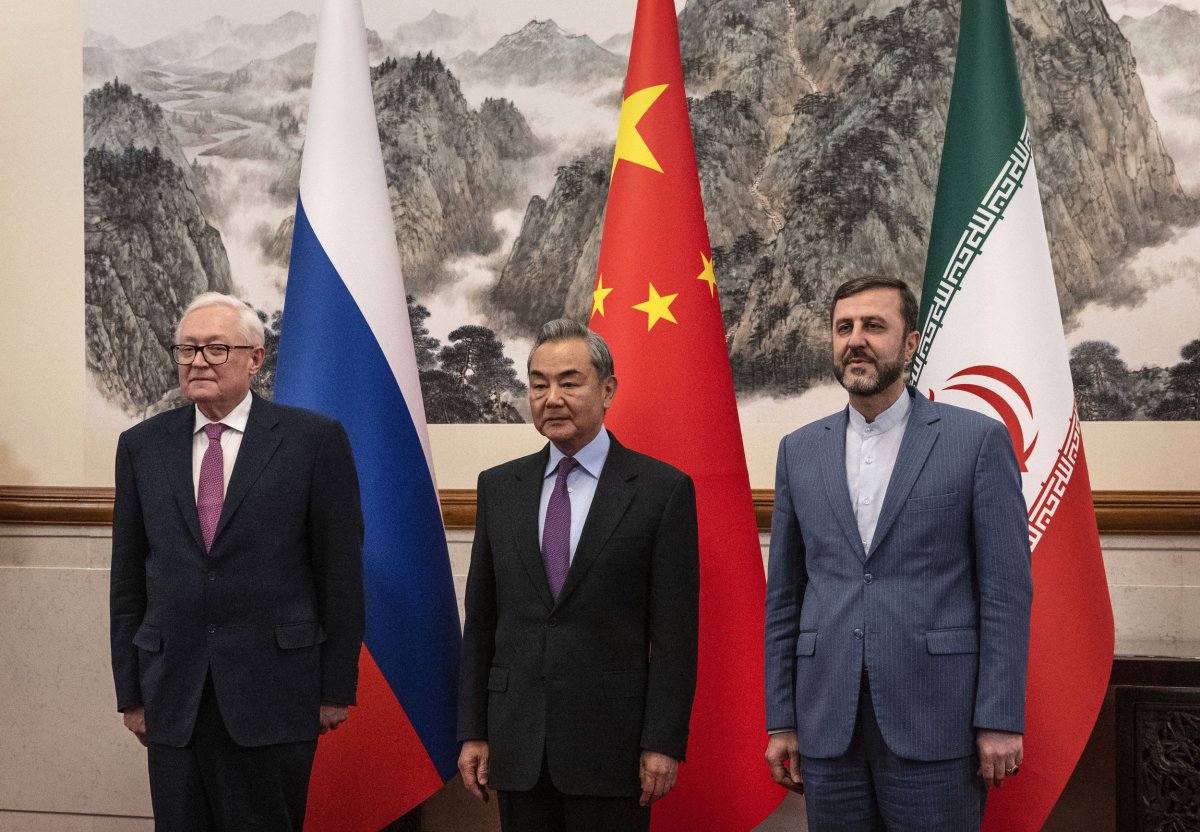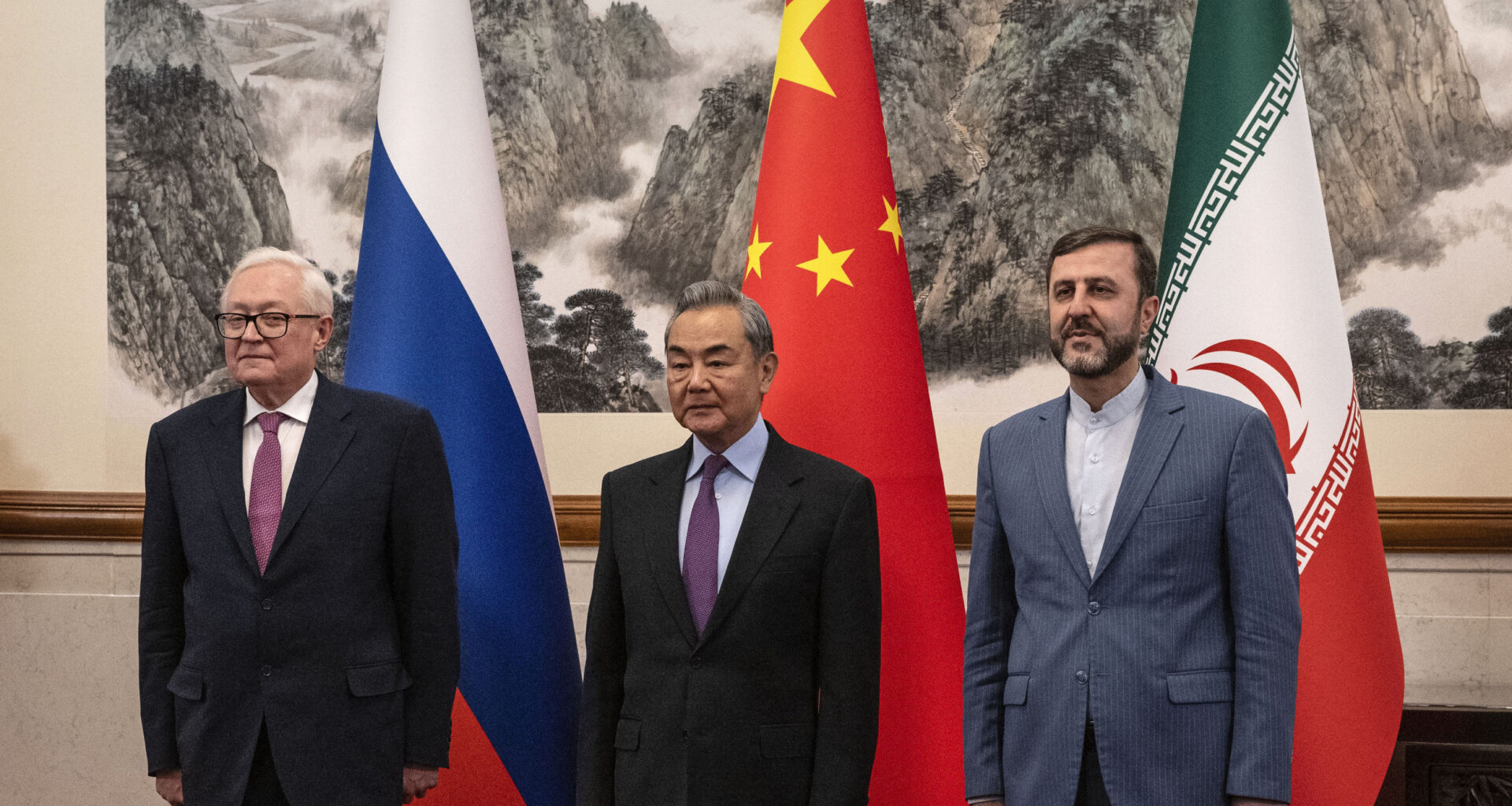Iran is closely coordinating with China and Russia through recent trilateral consultations to counter Europe’s attempts to invoke the United Nations‘ “snapback” sanctions, a spokesperson has said.
Under the Joint Comprehensive Plan of Action, the Iran nuclear deal agreed in 2015, sanctions can be reimposed on Iran’s military and trade sectors—targeting key figures with travel bans and assets freezes—if Tehran is found to have violated the JCPOA. Tehran says the mechanism lacks legal standing.
Newsweek has reached out to the Iranian Foreign Ministry and the European Commission’s foreign affairs spokesperson for comment.
Why It Matters
Iran has actively sought support from Russia and China in the aftermath of U.S. and Israeli airstrikes that damaged key nuclear facilities. China has pledged to help Iran confront “bullying” and protect its sovereignty through dialogue, while Russia has taken a firm stance against U.S. President Donald Trump‘s threats to strike Iranian nuclear infrastructure again.
Iran is seeking broader security coordination among its alliances, citing concerns over another attack. Ongoing tensions over Iran’s nuclear program and stalled U.S. talks escalated after Trump publicly threatened Tehran last month against restarting uranium enrichment.

China’s Foreign Minister Wang Yi (C) welcomes Russia’s Deputy Foreign Minister Sergey Ryabkov (L) and Iran’s Deputy Foreign Minister Kazeem Gharibabadi before a meeting regarding the Iranian nuclear issue at the Diaoyutai State Guesthouse in…
China’s Foreign Minister Wang Yi (C) welcomes Russia’s Deputy Foreign Minister Sergey Ryabkov (L) and Iran’s Deputy Foreign Minister Kazeem Gharibabadi before a meeting regarding the Iranian nuclear issue at the Diaoyutai State Guesthouse in Beijing on March 14, 2025. China urged an end to “illegal” sanctions on Iran as it hosted diplomats from that country and Russia on March 14 for talks Beijing hopes will restart long-stalled negotiations on Tehran’s nuclear programme.
More
POOL/AFP/Getty Images
What To Know
Iran has formally notified the U.S. that it would consider any attempt to reinstate sanctions through the snapback mechanism to be illegal, according to a letter sent by Iranian Foreign Minister Abbas Araghchi to the U.N.’s secretary-general and the five-member Security Council.
Ebrahim Rezaei, Iran’s National Security Commission spokesperson, told Iranian lawmakers that snapback sanctions would reactivate six past U.N. resolutions, including the arms embargo banning military sales to Iran as well as arms exports. It would also impose export controls, travel bans, and asset freezes on key targets.
France, Germany and the United Kingdom—the three European signatories of the JCPOA continuing talks with Tehran—warned that they may trigger the snapback by the end of August if no progress is made. Iran previously threatened to raise uranium enrichment to weapons-grade levels and exit the Nuclear Non-Proliferation Treaty if Western powers move forward with the plan.
Iran and the European interlocutors, sometimes known as the E3, held their first formal talks in Turkey last month since the 12-day conflict with Israel in June, with discussions centered on possible further sanctions relief in exchange for curbs on Tehran’s enrichment program.
The E3, along with China and Russia, are the remaining parties to the 2015 nuclear deal expiring in October, from which the United States withdrew in 2018.
China roundly condemned the Israeli and U.S. airstrikes on Iran, and at a trilateral meeting with Russia in Tehran in July, Beijing and Moscow backed Iran against more Western sanctions, pointing to their opposition to any momentum to reinstate the snapback.
Iran, China and Russia had also signaled closer coordination on government positions and actions when their top diplomats met in China a week earlier on the margins of the Shanghai Cooperation Organization summit of foreign ministers.
Separately, Tehran has expanded defense ties with China and Russia through joint naval drills and strategic consultations, and may be seeking advanced weapons and deeper military cooperation.
What People Are Saying
Iranian Deputy Foreign Minister Kazem Gharibabadi said on July 22: “We will express our position regarding the E3’s comments on the snapback mechanism, which we think lacks any legal ground. Nonetheless, our effort will be to see if we can find common solutions to manage the situation. It has been seven years that the nuclear deal is not being implemented by the Europeans following the U.S. departure from it. How can they argue that Iran is not following the deal when they themselves have not done so?”
Russian Foreign Ministry spokesperson Maria Zakharova said on July 30: “Serious alarm is raised by regularly voiced threats directed toward Iran to carry out new rocket-bomb attacks on its nuclear facilities. These declarations cynically cloak themselves behind ostensible concerns about the non-proliferation of nuclear weapons.”
A European diplomat, on condition of anonymity because of the sensitivity of the talks, told the Associated Press on July 25: “A possible delay in triggering snapback has been floated to the Iranians on the condition that there is credible diplomatic engagement by Iran, that they resume full cooperation with the IAEA (International Atomic Energy Agency), and that they address concerns about their highly-enriched uranium stockpile.”
What Happens Next
Iran says it is open to technical discussions after suspending cooperation with the IAEA, which is expected to visit Tehran this month.
